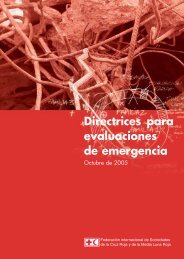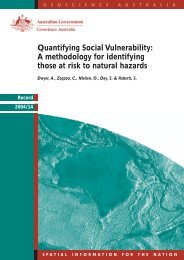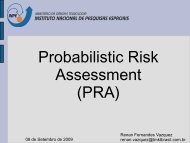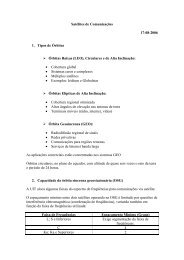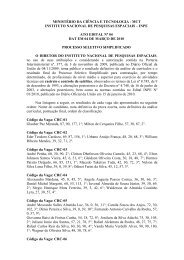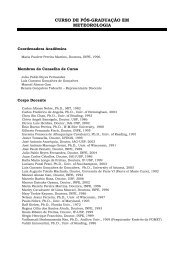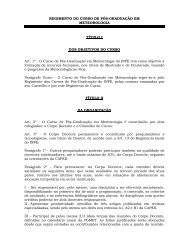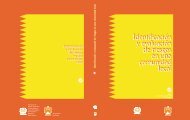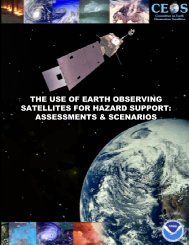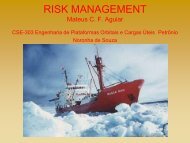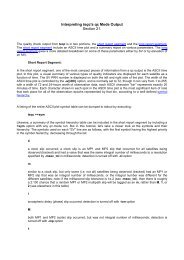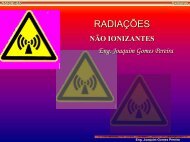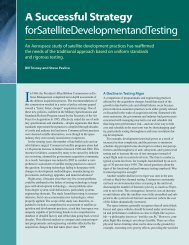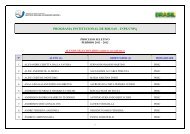Living with Risk. A global review of disaster reduction initiatives
Living with Risk. A global review of disaster reduction initiatives
Living with Risk. A global review of disaster reduction initiatives
Create successful ePaper yourself
Turn your PDF publications into a flip-book with our unique Google optimized e-Paper software.
6<br />
<strong>Living</strong> <strong>with</strong> <strong>Risk</strong>: A <strong>global</strong> <strong>review</strong> <strong>of</strong> <strong>disaster</strong> <strong>reduction</strong> <strong>initiatives</strong><br />
effort has produced a considerable body <strong>of</strong><br />
technical material (publications, slides and<br />
video programmes). Print copies are distributed<br />
free <strong>of</strong> charge to institutions dealing <strong>with</strong><br />
<strong>disaster</strong> mitigation in member countries and<br />
electronic copies are also made available on the<br />
Internet for worldwide access. PAHO works<br />
at the highest level in member countries to<br />
ensure that <strong>disaster</strong> mitigation becomes an<br />
integral part <strong>of</strong> national <strong>disaster</strong> <strong>reduction</strong><br />
programmes. Special programmes to develop<br />
technical guidelines and political support to<br />
vulnerability assessments and <strong>disaster</strong> mitigation<br />
for water systems and health services have<br />
been developed over the last decade.<br />
PAHO has a letter <strong>of</strong> understanding <strong>with</strong> the<br />
ISDR Secretariat, in which both parties have<br />
agreed on a number <strong>of</strong> measures to strengthen<br />
cooperation in priority areas for the region,<br />
such as the publication <strong>of</strong> studies, joint lessonslearned<br />
exercises and the strengthening <strong>of</strong> the<br />
Regional Disaster Information Centre<br />
(CRID), a regional multi-organization consortium<br />
formed by the Coordinating Centre for<br />
the Prevention <strong>of</strong> Natural Disasters in Central<br />
America (CEPREDENAC), Costa Rica's :<br />
National <strong>Risk</strong> Prevention and Emergency<br />
Response Commission (CNE), the International<br />
Federation <strong>of</strong> Red Cross and Red Crescent<br />
Societies (IFRC), ISDR, Médecins sans<br />
frontières (MSF) and PAHO/WHO.<br />
PAHO, in collaboration <strong>with</strong> ISDR, is working<br />
on the implementation <strong>of</strong> a development<br />
plan for CRID in San José, Costa Rica. ISDR<br />
and PAHO have also agreed to increase access<br />
to <strong>disaster</strong> information, exchange and networking<br />
among countries and organizations in the<br />
region, through the joint support <strong>of</strong> CRID and<br />
national and subregional <strong>disaster</strong> information<br />
networks, including the Caribbean Disaster<br />
Information Network.<br />
PAHO<br />
Washington, D.C., United States<br />
Tel: (+1-202) 974 3434<br />
Fax: (+1-202) 974 3663<br />
E-mail: poncelej@paho.org<br />
Web site: www.paho.org/<strong>disaster</strong>s<br />
www.<strong>disaster</strong>.net<br />
World Meteorological Organization<br />
(WMO)<br />
Based in Geneva, Switzerland, WMO coordinates<br />
<strong>global</strong> scientific activity to allow increasingly<br />
prompt and accurate weather information<br />
and other services for public, private and<br />
commercial use. WMO activities contribute to<br />
the safety <strong>of</strong> life and property, the socioeconomic<br />
development <strong>of</strong> nations and the<br />
protection <strong>of</strong> the environment.<br />
WMO participated actively in the implementation<br />
<strong>of</strong> IDNDR and is now a member <strong>of</strong> the<br />
ISDR Inter-Agency Task Force for Disaster<br />
Reduction. It supports the work <strong>of</strong> its working<br />
groups, in particular those on Climate and<br />
Disaster Reduction (for which it has lead<br />
responsibility), on Early Warning and on<br />
Vulnerability and <strong>Risk</strong> Assessment. The<br />
WMO constituent bodies, including the<br />
Congress and the Executive Council, follow<br />
and provide guidance on the policy, scientific<br />
and technical aspects <strong>of</strong> the implementation <strong>of</strong><br />
ISDR objectives at the regional and <strong>global</strong><br />
levels.<br />
As nearly three-quarters <strong>of</strong> all natural <strong>disaster</strong>s<br />
are related to weather and climate, WMO has<br />
a number <strong>of</strong> scientific and technical<br />
programmes related to the mitigation <strong>of</strong> natural<br />
<strong>disaster</strong>s supported by the participation <strong>of</strong><br />
National Meteorological and Hydrological<br />
Services (NMHSs) and a number <strong>of</strong> Regional<br />
Specialized Meteorological Centres (RSMCs)<br />
worldwide. The WMO World Weather Watch<br />
(WWW) programme coordinates the preparation<br />
and distribution <strong>of</strong> weather, climate and<br />
hydrological data, analyses and forecast products<br />
to all nations. The WMO Tropical<br />
Cyclone Programme promotes the establishment<br />
<strong>of</strong> national and regionally coordinated<br />
systems to ensure effective preparedness so that<br />
the loss <strong>of</strong> life and damage caused by tropical<br />
cyclones and associated phenomena are<br />
reduced to a minimum. The WMO Public<br />
Weather Services (PWS) programme supports<br />
NMHSs in <strong>disaster</strong> <strong>reduction</strong> planning by<br />
providing a variety <strong>of</strong> routine forecasts and<br />
information to enhance the social and economic<br />
well-being <strong>of</strong> nations. The World Climate<br />
Programme (WCP) provides an authoritative<br />
316



